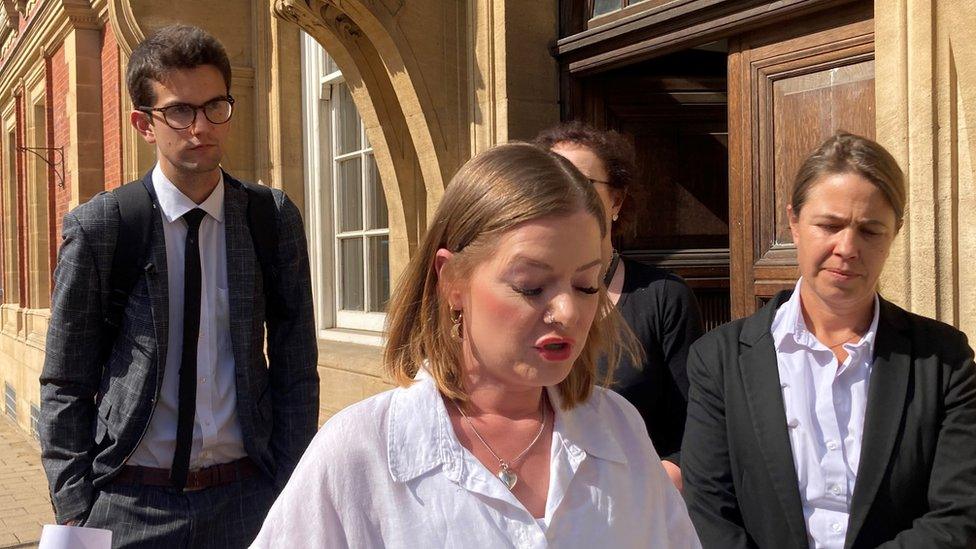Do problem gamblers need more protection?
- Published

Mrs Ashton said her husband was a bright, happy and bubbly person
The death of Luke Ashton has raised difficult questions about whether more needs to be done to stop gamblers drowning in spiralling debt.
The 40-year-old, from Leicester, took his own life in April 2021 after amassing huge debts betting online.
Coroner Ivan Cartwright said at the conclusion of his inquest on Thursday he was concerned Betfair, the company Mr Ashton used to place his bets, did not meaningfully intervene when his gambling spiked in the weeks before his death.
Analysis of his betting showed he had started to gamble more frequently, and stake higher sums.
He often placed bets early in the morning and late at night on sports including Austrialian greyhound racing and women's netball, as he chased his losses while at the same time planning to end his life.
Mr Ashton had previously confessed he had a gambling problem to his wife Annie in 2019 and the couple sold their home to clear debts of £18,000 from loans he had taken out to feed his addiction.
He self-excluded himself from Betfair Exchange, where he placed almost all his bets, for six months.
But, he then relapsed and returned to gambling during the pandemic lockdown - a fact he concealed from his wife.

Mrs Ashton said the coroner's conclusion vindicated her long-held position that gambling caused her husband's death
The coroner said he was "perplexed" an algorithm, employed by Betfair to assess customer risk, had led to Mr Ashton being deemed "low risk" rather than flagging him as a problem gambler.
He said opportunities were missed to pause, curb or stop Mr Ashton's betting and Betfair should have done more.
Betfair said it had met all the regulatory standards which were in place at the time, but conceded, in hindsight, it should have done more to help Mr Ashton.
Mr Ashton's death again highlights the difficult balancing act between supporting the commercial ambitions of betting firms and the need to keep gamblers safe from harm.
Psychology of problem gamblers
Prof Mark Griffiths, from Nottingham Trent University, has been researching problem gambling for 37 years and says the financial losses make it more destructive than other addictions.
He told the BBC the psychology of problem gamblers meant they often continue placing bets after heavy losses - even if they are stretching their personal finances beyond what they can afford.
"In their minds, gamblers do not continuously lose - gamblers actually feel like continuously nearly win," he said.
"They think 'if that reel had gone one more step, I would have won that money'. It's what we call the psychology of the near-miss."

The government says there are an estimated 300,000 problem gamblers in the UK
Prof Griffiths added: "The great thing about gambling now is that the companies have every single click stroke of what you do online.
"They know how much you're spending, what games you're playing, how long you're playing...that can be used for very positive advantages now.
"All the major gambling companies use artificial intelligence to predict and spot problem gambling online".
AI technology is behind new safeguards introduced by the Gambling Commission last September, which require gambling companies to monitor their customers' betting, to stop it getting out of control.
The commission has promised tough action against operators who don't do enough to prevent problem gambling.

Annie Ashton said she hoped the coroner's conclusion would trigger changes in the gambling industry
A Gambling Commission spokesman told the BBC: "Over the last two years (since April 2021) the Commission has concluded 42 enforcement cases with operators paying over £90m because of regulatory failures.
"This is unprecedented action against gambling operators but we are now starting to see signs of improvement.
"We are currently in the process of implementing the Government's recent white paper.
"As part of this we will be consulting on safety measures to ensure bonus offers and incentives do not lead to excessive or harmful gambling, set further product controls for safer online games, and require operators to identify and take action for financially vulnerable consumers and to tackle significant unaffordable gambling through frictionless checks that are not disruptive for consumers."
Do the new gambling safeguards go far enough?
Prof Griffiths said the UK now has some of the world's tightest restrictions, and that most people gamble without any problems.
But he does believe "free bonus bets", which are still allowed under the new regulations, should be limited or even stopped.
"For a problem gambler, these are the kind of things where you get an urge or a trigger for you to start again," he said.
He also also believes voluntary controls should become compulsory.
"I would like to see mandatory play-breaks, so if you've been playing for an hour, your account gets shut down for a certain amount of time," he said.
"I would like to see mandatory limit-setting, so when you go onto a site you have to put in how much you're prepared to lose, and also you can set time-limits as well".
How many are affected by problem gambling?
The government says there are an estimated 300,000 problem gamblers in the UK, and rates are highest in online casino games.
Campaign group Gambling With Lives say it is supporting more then 80 families who "lost people to suicide caused by gambling".
Its strategy director Will Prochaska said the issues raised in Mr Ashton's case are all too familiar.
"It's shocking that an operator isn't intervening when we think they should be," he said.
"And we see that time and again that the Gambling Commission are fining operators up and down the country for similar failings that have been explored in this case, and sadly the Gambling Commission's fines don't seem to be changing the behaviour of the operators, so we are urging them to start taking licences away.
"The most shocking thing is the industry continues to play this narrative that there's just a small number of individuals who are at risk of gambling-related harm. And it's simply not true.

"Anybody can become addicted to products which have been designed to become addictive and then they're marketed at people… so we've got a real crisis on our hands".
Chief executive of Flutter UKI - Betfair's parent company - Ian Brown said: "Flutter UKI is committed to doing the right thing and creating an environment for customers to enjoy our products in a safe and sustainable way.
"Over the past three years we have made significant changes to our controls, including mandatory deposit limits for customers who return to our sites after a period of self-exclusion.
"We hold ourselves to the absolute highest standards in the industry and we will, of course, incorporate additional learnings from this (Mr Ashton's ) tragic case into our systems and processes."

If you have been affected by any of the issues in this story, you can visit the BBC Action Line for help.

Follow BBC East Midlands on Facebook, external, on Twitter, external, or on Instagram, external. Send your story ideas to eastmidsnews@bbc.co.uk, external.
Related topics
- Published29 June 2023
